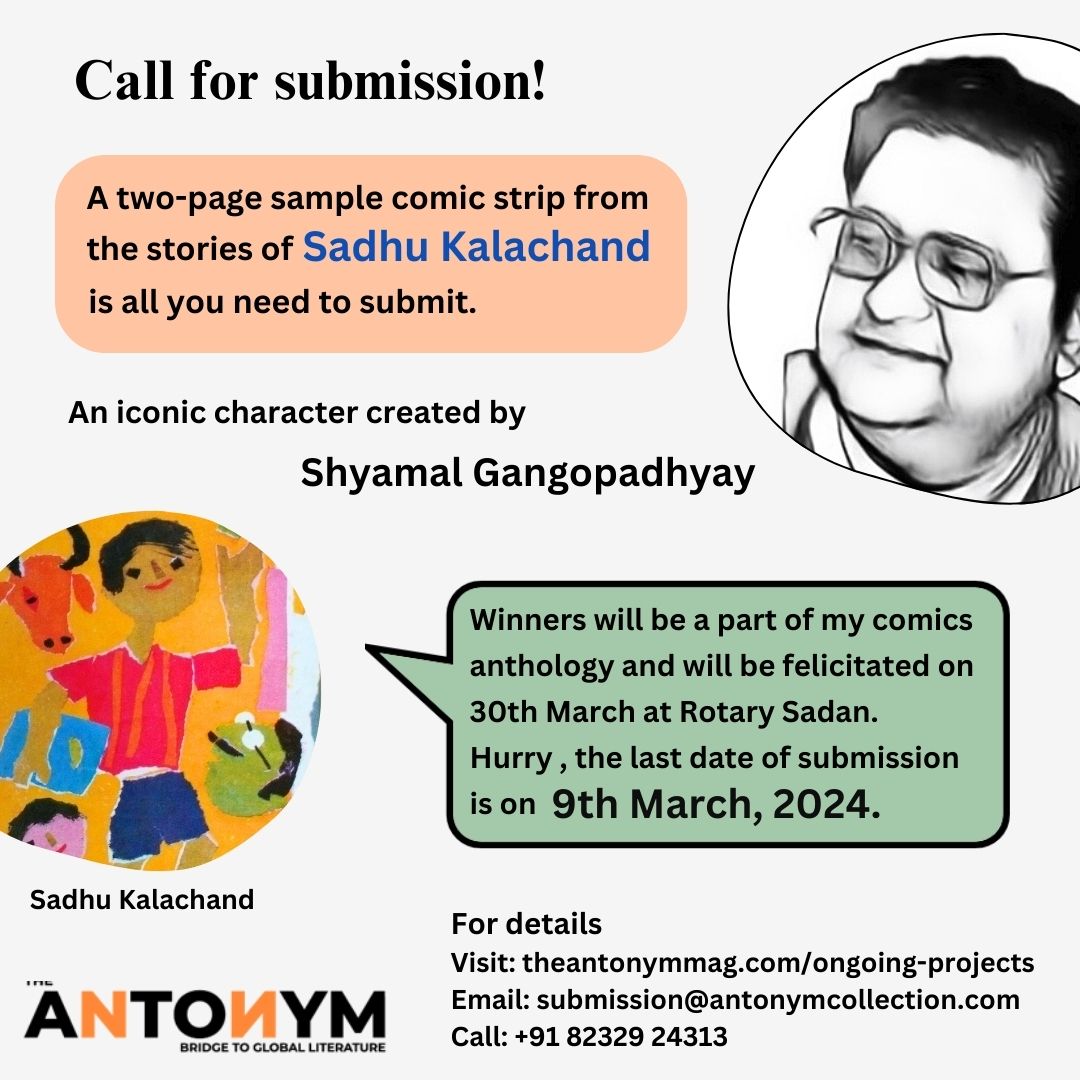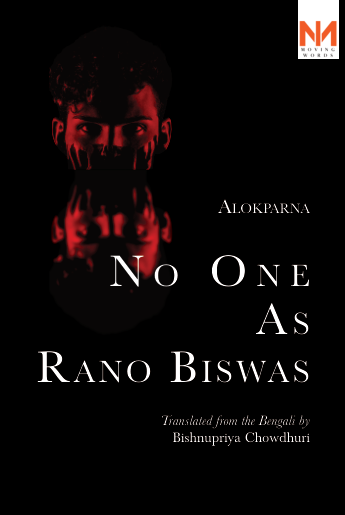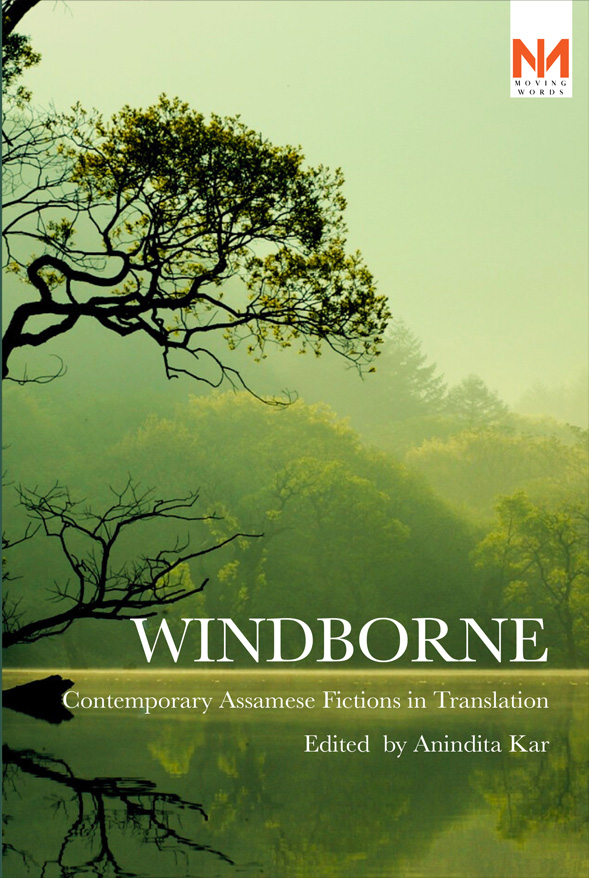The Antonym instituted the Tagore Award for translated fiction from Bengali in 2021. There was great response to the call for submission and through a two step process finally we arrived at tlhe winning entries. Here is the story that came third in the inaugural season of the Tagore Award for translated fiction.
The Return
Written by Mahua Sen Mukhopadhyaya
Translated by Chandreyee Lahiri
For the full announcement, visit Tagore Award for Translated Fiction (from Bengali),2021 – Announcement
Translated from the Bengali by Chandreyee Lahiri
The skies over Kolkata are leaden and sinking swiftly under the weight of rain-swollen clouds. Scorched by the mid-June heat, poisoned by pollution, and parched to an unbearable thirst by dry winds, they now hover in quiet triumph over the tops of buildings in this concrete jungle, pregnant with the promise of relief. Shuprobha slips quickly into the alley. Half-built buildings rear up on either side, set together so closely that only an impossibly narrow sliver of space remains. At the end of this tunnel glimmers a glimpse of the pond. The most beautiful pond in the area. In fact, the last remaining pond.
The neighborhood had been changing to a steady beat over the past twenty years. One by one, the ponds were reclaimed. One by one, the fields and open spaces got obliterated. The urban population had exploded and birthed throngs of new people, all in need of shelter, and apartment buildings sprung up obligingly to provide for them. Towers packed with tiny flats, arranged like holes in a dovecote; box-like homes stacked neatly atop one another, rising three floors, five floors and eventually, reaching towards the sky in towers thirteen or fifteen stories high. The transformation was both stunning and complete.
A blinding flash lights up the alley, accompanied by a rumble from the sky so loud that it startles Shuprobha violently out of her daydreams. A pain shoots through her, fiery and intense. Where is it coming from? Almost immediately, she locates what feels like a pulsing ball of molten lead somewhere between her stomach and chest. Robbed of all breath, she stands still, hoping to make space for the malignant sensation so it can settle perhaps, to bearable levels. Around her, the storm picks up pace; polluted, dust-laden winds whipping around in a rapidly accelerating whirlwind that feels urban and un-pristine, with Shuprobha imprisoned in its eye.
Has the light changed a bit? From the corner of her eye, she catches a glimpse of someone on the far bank of the pond. Something about the image niggles at her brain and doesn’t quite sit right. She carefully lets out the breath she has been holding to find that the pain has abated. In its place now is an amorphous discomfort and a vague sense of unease. She pulls herself together and resumes walking.
Towards the end of the alley, memories engulf her of a large [1]kodom tree that used to stand there, its limbs stretching out wide in all directions. In the rainy season, the branches would explode with flowers; white, spiky globes filling the air with a heady perfume. She passes by the exact spot where it used to stand and catches a whiff of that fragrance, unlikely and unearthly, from non-existent flowers. The damp air seems to be wafting their delicate aroma to her across vast tracts of history dappled with half-forgotten images and sensations. Memories of other details around that familiar, musky smell tumble in; the twilight hush of spring evenings, the furious onslaught of [2]monsoon rains and snatches of haunting melodies drifting down from Ranga [3]Kaka’s [4]sarangi from his top-floor room. She would have been around twelve years old then. The flood of sensory delights would suffuse her impressionable heart with mounting pressure until unknown floodgates opened and let the essence of the music, fragrance and rain pour into her very blood, making her one with them.
On the heels of this, like another flash of lightning, arrives a related set of memories, this time of the person she thinks she saw walking by the pond. The man had been dressed in a traditional [5]dhoti-panjabi and was wrestling with his umbrella, flipped inside-out by the storm. He looked just like Ranga Kaka! Not the Ranga Kaka who was reduced to a shadow by Cancer, lying melted into his deathbed. This was the Ranga Kaka who would come home at summer’s end from the boarding school in [6]Deoghar where he was the principal. She would wait in the balcony for the first glimpse of him walking up the road. He had not married, and his vast stores of unspent affection were reserved for Shuprobha who reveled in it. The memory that he was her favorite person, resurfaces through the fogs of time.
Shuprobha has now reached the foot of the stairs leading into her building and catches her first glimpse of the girl. The dusk deepens and Shuprobha’s weariness threatens to overwhelm her.
The girl is in a green dress with a yellow-and-pink print but it’s the cut of the dress that catches her eye: bell shaped sleeves, a long skirt and lots of gathers by the chest. Why is the cut drawing her attention, though? It’s probably just that her eyes are conditioned by a lifetime of sewing. But wait, this is the kind of design she wore as a child! Where would this girl find something this old fashioned? The girl is looking right at her now, large eyes gleaming in a sweat-sheened face. Shaded by the dusk, she’s wearing a shy smile that holds a strange note of greeting. Shuprobha gets an odd feeling that if she returns the smile, she might forge a path through the flickering shadows of faded memories to connect with someone she once knew, someone dear.
But she is exhausted and focusses on trudging up the stairs. That vague discomfort she felt before has gathered strength and all she can think of is reaching her bed, where surely lies relief. She reaches the landing in front of her apartment and peeks over the stairway railing for another glimpse of the girl. Huh. Where did she go? Inside the flat, she collapses on the couch and calls out to Lokkhi, the maid.
‘Will you get me a drink of water?’
‘Goodness, [7]Mashima! Did you get caught in the rain?!’
‘What rain? There was lightning and wind but it all just fizzled out.’
‘Oh. But you’re soaked! Is this sweat? Why on earth are you sweating this hard? I’ll increase the fan speed.’
As Lokkhi fusses around her, something stirs in Shuprobha’s tired brain.
‘Lokkhi, your niece – the one named “Lovely” or something – has she arrived from your village? The girl downstairs looked so familiar. I wondered if it was your niece. Didn’t you show me a photo of her once?’
‘Lovely? No, she’s not here now! She arrived from our village last week and every day she swears she’s going to come see you. Hasn’t found the time yet although tonight apparently there’s time to go to the movies with her friends from next door. Some new flick with that hero, Deb, they’re all crazy about. Hmph! She’s getting to be a livewire, that one!’
Oh. Then who WAS that girl? Shuprobha lets her eyelids close as her body slides down a bit farther on the sofa in search of rest. Unbidden, an image swims up from the depths of her memory.
A lush field next to her childhood home, stretching out towards the horizon, its green vastness interrupted only by the white goal posts of a soccer field in the far distance. It was a time when her own horizons seemed to stretch just as wide, teeming with abstract promises. Exciting but unnamed possibilities seemed to be almost within reach. Long, lazy days full of idle chatter with Bornali, who lived on the next block. Together they had whiled away countless afternoons that faded into moon-washed evenings that, in turn, changed into carefree nights.
That girl downstairs looked just like Bornali! That’s got to explain that sense of familiarity. What’s wrong with me that I keep remembering people from so long ago? I’m so jumbled up. It’s age catching up with me. I’m an old, old lady. She smiles to herself as she resolves to tell her daughter and granddaughter about this. She can almost hear their chuckles at her drama. I’ll call Reshmi in a bit. Maybe she can stop by on her way home from work. That odd discomfort in her body stirs again: it has not dissipated. Reshmi is her only child and liable to get really annoyed if not informed about any health issues immediately. Plus, Somnath isn’t home tonight. He’s catching up with old friends and unlikely to be back until late.
‘Lokhi, before you head home would you get me a cold soda from the store downstairs?’
The sound of the front door closing tells her she has not called out in time. It takes Shuprobha a while to will herself to sit up, then she forces herself to head up to the terrace on the roof: she remembers the clothes drying on the washing line that might get caught in the rain.
Shuprobha reaches the terrace and pauses for breathe. As she looks around, an unexpected pleasure washes over her. There is still a little daylight left and the dark clouds from earlier have fled. It’s created a canvas for the setting sun, which has painted the skies all around in shades of orange and pink. A sweet breeze skips around lightly, refreshing everything it touches. She gazes at the jumble of building-tops ranged around her, punctuated by the leafy crowns of the few remaining coconut palm trees. The sights are familiar but the brilliant colors of the day’s end and the soft breeze tugs at something deep inside. A gentle peace wraps softly around her.
Her eyes catch on the rooftop terrace of the new building on the corner, away in the middle distance. A woman is taking clothes off a line there too but her back is turned to Shuprobha. Even at a distance, Shuprobha can tell she’s wearing a white sari and that its end is pulled over her head in a [8]‘ghomta’, the traditional head covering of ladies of the older generation. Something about her is very familiar. The keenness of Shuprobha’s scrutiny seems to pierce the distance and layers of time that lie between them and makes contact: the woman in white turns around and looks at her. Her gaze, though distant, is clear. Her face is alight with a familiar radiance, the eyes full of laughter. [9]Ma. Ma, from forty years ago. Ma, who has been gone for so very long.
Shuprobha quickly grabs a sari off the line, loops it anyhow around one arm and hurries down the stairs. Her feet are strangely clumsy and unsure on the familiar treads of the stairway. That fiery pain in the pit of her stomach flickers again. The sensation of unease flooding her body is fierce and causes a smoky haze of fear to trickle into her lungs. It fills them. She can barely breathe now.
Where’s my cell phone? I must call Reshmi somehow! But the pain is erupting, spreading like molten lava and she needs to go to the bathroom. It’s too late; she senses that her clothes are slowly getting sodden even though she can’t quite feel any of it. Her mind whirls in panic.
‘What is happening?! Somnath, why aren’t you back yet? Why isn’t anyone back! Wait, that’s the sound of feet on the stairs…Lokhi! Are you back? Someone, ANYONE…please come! Before it all goes dark, someone…!’
Her vision starts to dim and her body sags towards the ground. Realization dawns that it is beyond her now to call anyone and on its heels, arrives comprehension. The fear that had paralyzed her slowly lifts. A startling clarity courses through her mind, pushing past the terrible pain that still throbs inside, even as her senses start to numb. Gradually, Shuprobha’s limbs start to go limp, and her joints feel strangely loose. A drowsiness settles on her, inexorable and final.
What happened to the pain? I can’t feel anything.
Is this how I return then? Is this it?
I see. Alright then.
Shuprobha closes her eyes.
[1] Kodom (or Kadam) is a flowering tree native to South and South East Asia.
[2] The Monsoons are a period of heavy rain that visit India every summer, bringing relief from the intense summer heat.
[3] In Bangla ‘Kaka’ is the term for one’s father’s younger brother.
[4] A string instrument akin to a fiddle used in Hindustani classical music.
[5] The ‘Dhoti’ is a long piece of fabric that men traditionally drape around their waist and legs and the ‘panjabi’ is a tunic top.
[6] Deoghar is a city in the state of Uttarakhand and a popular vacation destination for Bengali’s.
[7] The literal translation of ‘Mashima’ is one’s mother’s sister but is also used as a respectful form of address for a female elder.
[8] Married Bengali women were traditionally expected to drape the end of their sari over their head to remain modest. It is a mostly archaic tradition that is now heeded mainly in conservative communities and the elderly.
[9] ‘Ma’ is the traditional way of addressing one’s mother, akin to ‘Mom/Mum’ or ‘Mommy/Mummy’.
The Antonym caught up with Chandreyee Lahiri, here is an excerpt from the conversation :
































0 Comments